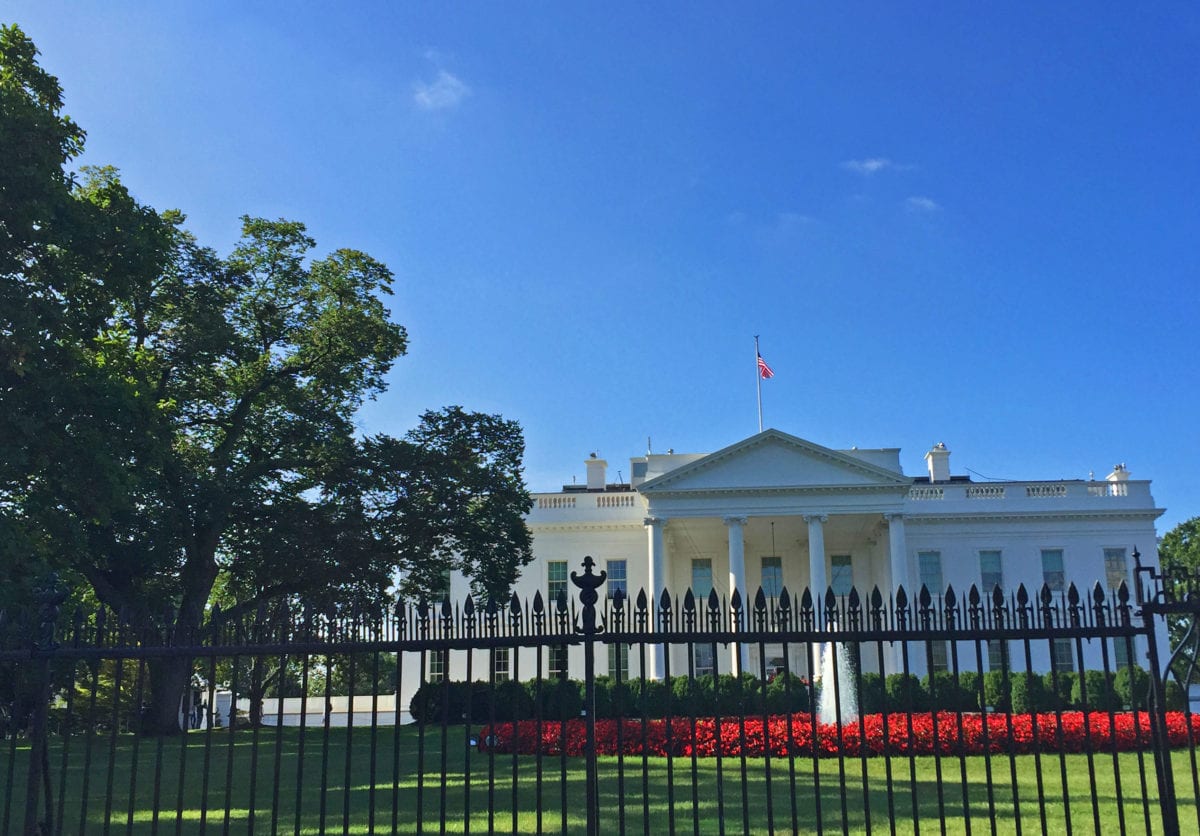By Glynn Wilson –
WASHINGTON, D.C. — Since the early days of science and later objective journalism, we have known that reaching breakthroughs in knowledge is gained over time in fits and starts.
A scientist, or a journalist for that matter, practicing the American invention of objective journalism, becomes immersed in the literature of a field, pouring over data, until a theory emerges. From there a hypothesis is developed. Only then can the theory be tested with experimentation.
Arriving at the truth is sometimes slow going. Only occasionally, a good idea comes on fast and catches on quick. Evolution works that way too. With the speed of changes at work in information technology, political changes can come on rapidly as well, as we saw in the presidential election of 2016.
One of the most famous stories in science is how Isaac Newton, the son of an English farmer, arrived at his law of gravity after observing the fall of apples in his father’s orchard.
Newton shared the apple anecdote with William Stukeley in 1726. No one found out until 46 years later when he published the story in Memoirs of Sir Isaac Newton’s Life in 1752.
“After dinner, the weather being warm, we went into the garden (and) drank tea under the shade of some apple trees,†Stukeley wrote. “He told me … the notion of gravitation came into his mind … occasion’d by the fall of an apple, as he sat in a contemplative mood.â€
Having time to think about ideas is critical. Hanging out in a campground works for me. Of course the bare minimum of financial security is critical. An Update on Thoreau’s Necessities of Life.
Social scientists sometimes use theories from hard science to develop social laws, as I did back in the day, when I came up with this: “When the going gets rough, keep an even keel and head for the beach. In other words, live by Wilson’s First Social Law: For every high there is an equal and opposite low. This is the social equivalent of Newton’s Third Law of Motion: For every action there is an equal and opposite reaction. Think about it.â€
Donald Trump
So now we are grappling with what to do about American journalism in the wake of the unlikely and mind jarring election of Donald Trump as president, who has turned out to be the biggest enemy of science and “the press†since Richard Nixon. At the same time, Trump’s election appears to be the best thing to happen to the press in Washington and New York since Watergate.
If you ask the editor of the New York Times, Dean Baquet from New Orleans, or Marty Baron of the Washington Post, about the state of American journalism, as Marvin Kalb recently did at the National Press Club in Washington, they both seem fairly sanguine about their economic futures, a turnabout that has happened due to bumps in reader support since the election.
But they were mostly mum on the state of democracy. Kalb tried to ask about it. They talked about their business models as if saving the New York Times financially was the same thing as saving democracy. It reminds me of a Harvard study from five years ago: Riptide: An Oral History of the Epic Collision Between Journalism and Digital Technology.
They do both worry about the future of local news, which is undergoing a very real crisis. Never mind the crisis of Trump’s government, which we will be reporting on next week.
We keep confusing democracy with capitalism. This may be one of the reasons the recent Ken Burns documentary on Vietnam came and went without much fanfare. The entire sorted affair was billed as a competition between democracy and communism, which is just inaccurate on its face. The antithesis of communism is capitalism. Even socialism is not the direct polar opposite of democracy. The best democracies are socialist democracies. (More on that later).
Is Facebook Bad for Democracy?
While many technology writers are wringing their hands about the negative effects of Facebook on democracy, the big mule elite establishment newspapers all of a sudden are not so concerned, since they are using social media to drive millions of readers to their journalism. They successfully used the Russian hacking-meddling-fake news story to turn the public’s attention back to them after years of losing ground to the web, and before that, their complacency about competition from new technology.
But what did the Russian hacking-fake news story do to the rest of us and the country?
Crickets.
There are journalists and yes bloggers around the country who have been working on building an alternative platform for news for many years, preparing for the day when the big chain newspapers are gone. If some kind of a press is critical for democracy, this is a critical endeavor.
While Trump is calling the New York Times and CNN “fake news,†the audience on Facebook has dried up for us, for now, as most everyone has been driven back to the so-called mainstream media for news since the election and the controversy. Time will tell how long their bumps last, and whether we can survive the anti-bubble. Sensational click bait is still alive and well out there in web media land as well as Facebook, and the MSM is as guilty of it as the fake news sites in some cases.
Then, of course, the computer progammer’s algorithm is still unreliable and appears easy to manipulate — if you have the money and an evil mind. I have been saying for years that we should not become so dependent on computer programmers for everything. They are the new “can’t live with ’em, can’t live without ’em.”
A Local News Crisis
Local newspapers are still dying every day. Not many will make it past my predicted drop dead date of 2020. What will happen in communities such as Mobile or Birmingham Alabama?
Mr. Baquet admits that in places like Mississippi and Alabama, there are school boards, city councils, congressional delegations and budgets not being covered now. How can we have a healthy democracy without a press covering state and local government?
If the Times wanted to do something about that, why did they sell off their 33 regional newspapers a few years back, including three in Alabama, in Tuscaloosa, Florence and Gadsden? I doubt they will go buy them back. Not now. Print’s future really is quite dead. They sold them off to another chain because their business side came to the decision they were doomed in the long run.
The Gannet chain has made a different calculation, as they have in Montgomery with the Advertiser, for example, trying to force readers to pay online, even though they have also laid off most of the staff reporters, editors and photographers that could have made their state and local news worth paying for.
Breitbart News Impact on the Election
If Facebook has became completely dominant as a media distributor and taking over the news-media ecosystem, as some writers indicate, this benefits the big papers, but hurts the little ones, and independent operators like us — unless you are the big money partisan press, such as Breitbart News. A study of 1.25 million election news articles found “a right-wing media network anchored around Breitbart developed as a distinct and insulated media system, using social media as a backbone to transmit a hyper-partisan perspective to the world.â€
Led by Steve Bannon, Trump’s Karl Rove, Breitbart went from a medium-sized site with a small Facebook page of 100,000 likes into a powerful force shaping the election with almost 1.5 million likes. In the key metric for Facebook’s News Feed, its posts got 886,000 interactions from Facebook users in January alone. By July, Breitbart had surpassed The New York Times in interactions. By December, it was doing 10 million interactions per month, about half as much as Fox News, which had 11.5 million likes on its main page. And Breitbart’s audience was hyper-engaged.
“There is no precise equivalent to the Breitbart phenomenon on the left,†according to the Atlantic, probably because the left is quite happy with the Times, the Post or a super aggregator like HuffPo, as well as their own headline chasing friends on Facebook.
Writers on this issue are coming to the conclusion that “this new, hyper-partisan media created the perfect conditions for another dynamic that influenced the 2016 election, the rise of fake news.â€
Joseph Bernstein argued that “the dark forces of the internet became a counterculture.†He called it “Chanterculture†after the trolls who gathered on meme-creating, often-racist message boards. Others ended up calling it the “alt-right.†This culture combined a bunch of people who loved to perpetuate hoaxes with angry Gamergaters with “free-speech†advocates like Milo Yiannopoulos with honest-to-god neo-Nazis and white supremacists.
“And these people loved Donald Trump,†as they story goes, although it is my educated opinion that this analysis that it was all Facebook’s fault is missing the mark. Yes, Facebook is vulnerable, and people are way too dependent on it.
Russia Investigation
But even the official investigations by the special counsel and in the U.S. Senate are not asking the key question here: Did Russian meddling and fake news really change the outcome of the election? We may never know the truth about that, although for Clinton supporters, don’t let the facts get in the way of a good excuse story and a powerful belief system.
In Clinton’s recent book promotion tour, everywhere she went she started out by saying “I take full responsibility†for losing the election. But instead of shouldering that responsibility, she turns around and blames everyone but herself — and the media. She blames Bernie Sanders, and to some extent James Comey, as well as the Russians. Clearly her followers on Facebook believe it. Just look at what they are still saying.
As I reported early on when the fake news story first broke in the Jeff Bezos Washington Post, I didn’t buy it then. I don’t buy it now. We predicted Trump would come out on top, before Michael Moore did, before Trump hired Bannon.
Key Words as Weapons
But consider this. Every key word Trump used in his Tweets, generated in research by Robert Mercer’s Cambridge Analytica, was also repeated in his speeches and broadcast live and then repeatedly on network as well as cable television news, I mean every single national and local news broadcast in every market in the country — and shared by the MSM and their followers on Facebook and Twitter as well.
Trump’s hyper-distracting messages became a giant feedback loop, and every bit of it was shared by Hillary Clinton’s supporters as well as Bernie Sanders’ supporters and Trump’s supporters — and the Russians as well as the media. Clinton’s followers thought sharing it was equivalent to debunking it. But all it did was help the fake news spread, like a toxic virus in the blood stream, or what has commonly come to be referred to as a meme.
If you have to blame it on somebody, how about Robert Mercer?
Let’s take a different tack and look at another article in The UK Guardian for more insight about hedge fund billionaire Robert Mercer and his so-called Media Research Center. It claimed to be “America’s media watchdog†and claims an “unwavering commitment to neutralizing leftwing bias in the news, media and popular culture.â€
It receives a large bulk of its funding — more than $10 million in the past decade — from a single source, Mercer, the money behind Donald Trump, his single largest donor. This is another billionaire trying to reshape the world according to his personal beliefs, and it worked in this election. The Koch brothers must be extremely envious. They’ve been going around doing it the old fashioned way, by buying influence with PBS, funding conservative think tanks, and donating to Republican campaigns.
Mercer made his money as a reclusive computer scientist, starting at IBM, where he made what the Association for Computational Linguistics called “revolutionary†breakthroughs in language processing. He later became CEO of Renaissance Technologies, a hedge fund that makes its money by using algorithms to model and trade on the financial markets. Medallion, one of its funds, is the most successful in the world – generating $55 billion so far. Since 2010, Mercer has donated $45 million to Republican political campaigns and another $50 million to ultra-conservative non-profits and think tanks.
Mercer rarely speaks in public and never to journalists, so to gauge his beliefs you have to look at where he channels his money. Global warming denial is at the top of the list, funding the climate change denial think tank, the Heartland Institute. He’s particularly interested in disrupting the power of the mainstream media, as is Bannon, his close associate. In addition to funding Breitbart with $11 million, a rightwing news site, set up with the express intention of being a HuffPo for the right, he funds the Media Research Center, with its mission of “correcting liberal bias.â€
Breitbart, full of nationalistic and anti-global views, some even antisemitic and Islamophobic, has been phenomenally successful. It’s the 29th most popular site in the U.S. with 2 billion page views a year. It’s bigger than the HuffPo, even bigger than PornHub. It’s the biggest political site on Facebook and Twitter.
Prominent rightwing journalist Andrew Breitbart, who founded the site but died in 2012, told Bannon that they had “to take back the culture.†At least for now, they have been successful.
Who will counter them?
Newspapers with a pay wall? Really?
Cambridge Analytica, a data analytics company spun out of a bigger British company called SCL Group, specializes in “election management strategies†and “messaging and information operations.†In military circles this is known as “psyops†– psychological operations. Otherwise known as mass propaganda that works by acting on people’s emotions.
The problem, however, is not just Facebook or the MSM. During the election, Google’s search results on certain subjects were being dominated by rightwing and extremist sites.
Jonathan Albright, a professor of communications at Elon University, North Carolina, who had mapped the news ecosystem and found millions of links between rightwing sites “strangling†the mainstream media, told a Guardian reporter that trackers from sites like Breitbart could also be used by companies such as Cambridge Analytica to follow people around the web and then, via Facebook, target them with ads.
On its website, Cambridge Analytica makes the astonishing boast that it has psychological profiles based on 5,000 separate pieces of data on 220 million American voters – it uses this data to understand people’s deepest emotions and then target them. The system, according to Albright, amounted to a “propaganda machine.â€
Facebook was the key to the entire campaign, according to Andy Wigmore, the European Union’s communications director who orchestrated Nigel Farage’s trip to Trump Tower. A Facebook ‘like’, he says, is their most “potent weapon.â€
“Because using artificial intelligence, as we did, tells you all sorts of things about that individual and how to convince them with what sort of advert,” he says. “And you knew there would also be other people in their network who liked what they liked, so you could spread. And then you follow them. The computer never stops learning and it never stops monitoring.â€
Cambridge University’s Psychometric Centre conducted a personality quiz on Facebook that went viral. More than 6 million people ended up doing it, producing an “astonishing treasure trove of data.”
But it’s not just Facebook. Do you wonder why the Trump administration wants all the voting data from all the states? Think about it.
Facebook profiles – especially people’s “likes†– can be correlated across millions of others to produce uncannily accurate results.
“The danger of not having regulation around the sort of data you can get from Facebook and elsewhere is clear,†Wigmore said. “With this, a computer can actually do psychology, it can predict and potentially control human behavior. It’s what the scientologists try to do but much more powerful. It’s how you brainwash someone. It’s incredibly dangerous.
“It’s no exaggeration to say that minds can be changed. Behavior can be predicted and controlled,†he said. “I find it incredibly scary. I really do. Because nobody has really followed through on the possible consequences of all this. People don’t know it’s happening to them. Their attitudes are being changed behind their backs.â€
It’s the database, and what may happen to it, that particularly worries Paul-Olivier Dehaye, a Swiss mathematician and data activist who has been investigating Cambridge Analytica and SCL for more than a year.
“How is it going to be used?†he asks. “Is it going to be used to try and manipulate people around domestic policies? Or to ferment conflict between different communities? It is potentially very scary. People just don’t understand the power of this data and how it can be used against them.â€
There are two things, potentially, going on simultaneously: the manipulation of information on a mass level, and the manipulation of information at a very individual level. Both based on the latest understandings in science about how people work, enabled by technological platforms built to bring us together.
“Are we living in a new era of propaganda think, one we can’t see, and that is working on us in ways we can’t understand? Where we can only react, emotionally, to its messages?”
Big Brother Is Here
In other words, is Big Brother already here and we just don’t know it yet?
“Definitely,†says Emma Briant. “The way that surveillance through technology is so pervasive, the collection and use of our data is so much more sophisticated. It’s totally covert. And people don’t realize what is going on.â€
You don’t have to subscribe to any conspiracy theory, Briant says, to see that a mass change in public sentiment is happening — or that some of the tools in action are straight out of the military’s or SCL’s playbook.
Another name for it is “cognitive warfare†with a “moral shock†that “has a disabling effect on empathy and higher processes such as moral reasoning and critical thinking.â€
While The Guardian writer concludes that “news organizations have to do a better job of creating new financial models.†Meanwhile, “a determined plutocrat and a brilliant media strategist can, and have, found a way to mould journalism to their own ends. Welcome to the future of journalism in the age of platform capitalism.â€
Keep in mind that a lot changed about Facebook once the company went public in 2012. The only way to get mass interactivity was to pay for it, leaving those who could not afford to tilting at tiny windmills with a few friends.
Data Backs Theory
To further bolster these assertions, the data piles up to back up the hypothesis and the theory.
According to The Atlantic, BuzzFeed’s Craig Silverman says that “in the final three months of the U.S. presidential campaign, the top-performing fake election-news stories on Facebook generated more engagement than the top stories from major news outlets such as The New York Times, The Washington Post, The Huffington Post, NBC News, and others.â€
But he also tracked fake news before the election, showing that Facebook’s “Trending†algorithm regularly promoted fake news.
By September of 2016, even the Pope himself was talking about fake news, defined here as actual hoaxes or lies perpetuated by a variety of actors, some of them out right fake news sites. A few days before the election, Silverman and fellow BuzzFeed contributor Lawrence Alexander traced 100 pro–Donald Trump sites to a town of 45,000 in Macedonia. Some teens there realized they could make money off the election, and just like that, became a node in the fake news network.
As the argument goes, which is overblown and leaves out key actors in my view, the chaos of a billion-person platform that competitively dominated media distribution plus the electoral efficacy of Facebook, along with the wild fake news and misinformation rampaging across the internet generally, plus the Russian hacking and meddling, and wallah. A dishonest election. But to discount the impact of television in this race is a big mistake.
Remember what CBS Chairman Les Moonves said as early as February of 2016? Trump’s candidacy might not be making America great, but it’s great for his company ratings and bottom line.
“It may not be good for America, but it’s damn good for CBS,” Moonves said at the Morgan Stanley Technology, Media and Telecom Conference in San Francisco.
Is this the print equivalent? Trump may not be good for American democracy, but he is good for the New York Times and the Washington Post?
Media Coverage
How did the mainstream “liberal†media perform during the election?
As late as August 20, the Washington Post said this of the campaigns:
“Hillary Clinton is running arguably the most digital presidential campaign in U.S. history. Donald Trump is running one of the most analog campaigns in recent memory. The Clinton team is bent on finding more effective ways to identify supporters and ensure they cast ballots; Trump is, famously and unapologetically, sticking to a 1980s-era focus on courting attention and voters via television.â€
Is this the equivalent of the MSM’s patriotic coverage of WMD’s in the run up to war in Iraq?
A week earlier, Trump’s campaign had hired Cambridge Analytica and ramped up to $70 million a month in Facebook advertising spending. We didn’t find out until after the election was over.
The next thing you know, Brad Parscale, Trump’s digital director, is doing the postmortem rounds talking up his victory as Trump made a Victory Tour across the country in states where he won, including Mobile, Alabama where it all started. I was there to cover it. I don’t know about the rest of the media. I don’t think HuffPo had a reporter there, or BuzzFeed or even the Atlantic.
“These social platforms are all invented by very liberal people on the west and east coasts,†Parscale said. “And we figure out how to use it to push conservative values. I don’t think they thought that would ever happen.â€
Prior to this election, the impact of internet technology generally and Facebook specifically was seen as favoring Democrats. Even a TechCrunch critique of Rosen’s 2012 article about Facebook’s electoral power argued, “the internet inherently advantages liberals because, on average, their greater psychological embrace of disruption leads to more innovation (after all, nearly every major digital breakthrough, from online fundraising to the use of big data, was pioneered by Democrats).â€
Certainly, the Obama tech team in 2012 thought this was the case. Of course, social media would benefit the (youthful, diverse, internet-savvy) left. And the political bent of just about all Silicon Valley companies runs Democratic.
In June 2015, The New York Times ran an article about Republicans trying to ramp up their digital campaigns, leading with this: “The criticism after the 2012 presidential election was swift and harsh: Democrats were light-years ahead of Republicans when it came to digital strategy and tactics, and Republicans had serious work to do on the technology front if they ever hoped to win back the White House.â€
It cited Sasha Issenberg, sometimes called the most astute reporter on political technology. “The Republicans have a particular challenge,†Issenberg said, “which is, in these areas they don’t have many people with either the hard skills or the experience to go out and take on this type of work.â€
Enter Robert Mercer and Steve Bannon.
By late October, the role that Facebook might be playing in the Trump campaign began emerging. Joshua Green and Issenberg reported a long feature on the data operation. The Trump campaign was working to suppress “idealistic white liberals, young women, and African Americans,†and they’d be doing it with targeted, “dark†Facebook ads. These ads are only visible to the buyer, the ad recipients, and Facebook. No one who hasn’t been targeted by then can see them. How was anyone supposed to know what was going on, when the key campaign terrain was literally invisible to outside observers?
Issenberg and Green called it “an odd gambit†which had “no scientific basis.†The conventional wisdom was that Trump was going to lose, and badly. Talk about getting it wrong. Bad wrong.
In the days before the election, The HuffPo data team had Clinton’s election probability at 98.3 percent. A member of the team, Ryan Grim, went after Nate Silver for his more conservative probability of 64.7 percent, accusing him of skewing his data for “punditry†reasons. Grim ended his post on the topic, “If you want to put your faith in the numbers, you can relax. She’s got this.â€
In the middle of the summer of the election, the former Facebook ad-targeting product manager, Antonio GarcÃa MartÃnez, released an autobiography called Chaos Monkeys. He called his colleagues “chaos monkeys,†messing with industry after industry in their company-creating fervor.
“The question for society,†he wrote, “is whether it can survive these entrepreneurial chaos monkeys intact, and at what human cost.â€
The Real Epitaph of the Election
The Atlantic says: “This is the real epitaph of the election.â€
Maybe. I call them Rat Fuckers. We all got “rat fucked,†and not just by Facebook, but by Google and the MSM. Call Trump’s election a giant con. A dangerous reality show with real world consequences. Whatever. Here we are.
How will the Times and the Post respond? According to Baquet and Baron, by doing exactly what they’ve always done, pretty much the same way, only “quicker.†Really?
We have a better idea. We just need a billionaire or a millionaire or two to fund it.
It seems to me that we need a new kind of news organization that moves light years beyond the old newspaper bureacracies with all the filters and norms of stifling professional behavior developed to cover the 20th century world. It is clear that with a few notable exceptions, maybe the Times and the Post, that organizational model is ill-equipped to deal with this new world we find ourselves stressed out in.
Every surviving news outfit from that world seems to think the answer is chasing sensational click bait to drive traffic to web ads, in some cases coupled with sponsored content and a pay wall. This might satisfy the wealthy who can afford to pay for it and like news about celebrities and football, although I doubt it saves democracy in the long run. Meanwhile the digital divide spreads.
Breitbart has no plans for a pay wall. They don’t need to make money to pay reporters. They have money. They know pay walls inhibit mass traffic. They are in it to manipulate public opinion, not to make money.
Clearly Facebook is not the answer. Computer programmers are not going to cover city council meetings. It is useful to get the word out, but works best for those with lots of money. Hopefully this cloudy picture will come into focus more clearly in the next couple of years.
—
Editor’s Note: I could not have written this piece for any mainstream news outfit. It doesn’t fit into their traditions or serve their business models.
Next week, The State of Government and Democracy in Trump’s America, with night photos from D.C.

















Great article Gylnn, have read many aspects of this story around the web including I believe great articles about this from The Guardian. I haven’t seen your site before and would be interested in seeing other stuff you guys do but am on a chase right now of some other stuff.